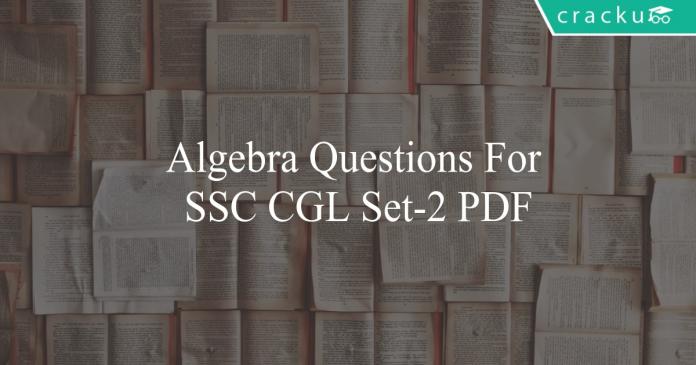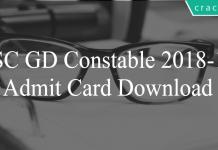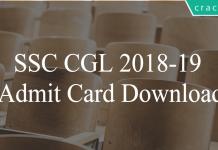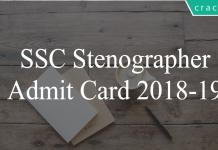Algebra Questions For SSC CGL Set-2 PDF
Download SSC CGL Algebra questions with answers PDF based on previous papers very useful for SSC CGL exams. 20 Very important Algebra objective questions (MCQ’s) for SSC exams.
Download Algebra Questions For SSC CGL Set-2 PDF
Question 1: If If $(3^{x})(3^y) = 9$ and $(5^{x})(125^y) = 625$, then find (x,y)
a) (4,-2)
b) (0,2)
c) (1,1)
d) (6,-4)
Question 2: The lines 2x+y = 3 and x+2y = 3 intersect at points
a) (1,1)
b) (-1,5)
c) (0,3)
d) (3,-3)
Question 3: Find the value of $\Large\frac{\frac{1}{2}.\frac{1}{2}.\frac{1}{2}+\frac{1}{4}.\frac{1}{4}.\frac{1}{4}+\frac{1}{5}.\frac{1}{5}.\frac{1}{5}-3.\frac{1}{2}.\frac{1}{4}.\frac{1}{5}}{\frac{1}{2}.\frac{1}{2}+\frac{1}{4}.\frac{1}{4}+\frac{1}{5}.\frac{1}{5}-(\frac{1}{2}.\frac{1}{4}+\frac{1}{4}.\frac{1}{5}+\frac{1}{2}.\frac{1}{5})}$
a) $\large\frac{17}{20}$
b) $\large\frac{19}{20}$
c) $\large\frac{13}{20}$
d) $\large\frac{11}{20}$
Question 4: Find the value of $\Large\frac{\frac{1}{3}.\frac{1}{3}.\frac{1}{3}+\frac{1}{4}.\frac{1}{4}.\frac{1}{4}+\frac{1}{9}.\frac{1}{9}.\frac{1}{9}-3.\frac{1}{3}.\frac{1}{4}.\frac{1}{9}}{\frac{1}{3}.\frac{1}{3}+\frac{1}{4}.\frac{1}{4}+\frac{1}{9}.\frac{1}{9}-(\frac{1}{3}.\frac{1}{4}+\frac{1}{4}.\frac{1}{9}+\frac{1}{3}.\frac{1}{9})}$
a) $\large\frac{25}{36}$
b) $\large\frac{19}{36}$
c) $\large\frac{24}{35}$
d) $\large\frac{17}{26}$
Question 5: What is the square root of 97-16$\sqrt{3}$
a) 9-4$\sqrt{3}$
b) 9+4$\sqrt{3}$
c) 7-4$\sqrt{3}$
d) 7+4$\sqrt{3}$
SSC CGL Previous Papers Download PDF
Get 780+ mocks for just Rs. 299
Question 6: Find the number of prime factors of 14560
a) 3
b) 4
c) 5
d) 6
Question 7: Find the number of even factors of 15680.
a) 42
b) 21
c) 36
d) 24
Question 8: Find the number of even factors of 16200.
a) 60
b) 42
c) 36
d) 45
Question 9: Find the number of even factors of 3920.
a) 24
b) 42
c) 36
d) 30
Question 10: Find the number of odd factors of 13500.
a) 24
b) 32
c) 16
d) 48
18000+ Questions – Free SSC Study Material
Question 11: Find the number of prime factors of 5544.
a) 7
b) 4
c) 6
d) 3
Question 12: What is the square root of $214 – 78\sqrt{5}$
a) $13-3\sqrt{5}$
b) $17-4\sqrt{5}$
c) $13-6\sqrt{5}$
d) $17-3\sqrt{5}$
Question 13: If $(9^{x})(3^y) = 81$ and $(2^{x})(4^y) = 32$, then find $(x, y)$
a) (1,4)
b) (2,1)
c) (1,2)
d) (4,1)
Question 14: If p = 21, q = -16, r = -5, then find the value of $\large\frac{8p^{3}+8q^{3}+8r^{3}}{9pqr}$
a) $\Large\frac{8}{3}$
b) $\Large\frac{16}{3}$
c) $\Large\frac{8}{9}$
d) $\Large\frac{8}{16}$
Question 15: Find the value of $\sqrt{12+\sqrt{12+\sqrt{12+……}}}$
a) 4
b) 3
c) 6
d) 7
Question 16: What is the units digit of $437^{79}$ ?
a) 7
b) 9
c) 1
d) 3
Question 17: If $(p-q)^{2} = 9$ and $(p+q)^{2} = 121$ $p,q>0$, then find the value of $\frac{pq}{p+q}$
a) $\frac{22}{13}$
b) $\frac{24}{13}$
c) $\frac{24}{11}$
d) $\frac{28}{11}$
Question 18: What is the units digit of $639^{147}$ ?
a) 7
b) 9
c) 1
d) 3
Question 19: If $3p – (1/2)(p -3) = 14$, find p ?
a) 2
b) 3
c) 4
d) 5
Question 20: A fraction is greater than its reciprocal by $\Large\frac{9}{20}$. What is the fraction?
a) $\Large\frac{5}{4}$
b) $\Large\frac{-4}{5}$
c) $\Large\frac{1}{5}$
d) Either A or B.
1500+ Free SSC Questions & Answers
Answers & Solutions:
1) Answer (C)
Given $(3^{x})(3^y) = 9$
=> $3^{x+y} = 3^{2}$
=> x+y = 2 — (1)
$(5^{x})(125^y) = 625$
=> $(5^{x})((5^3)^y) = 5^4$
=> $(5^x)(5^3y) =5^4$
=> $5^x+3y = 5^4$
=> $x+3y = 4$ — (2)
Solving (1) and (2)
=> 2y = 2 => y = 1
Substituting y = 1 in (1) –> x = 1
Therefore, (x,y) = (1,1)
2) Answer (A)
Given 2x+y = 3 and x+2y = 3
Solving above equations,
We get x = 1 and y = 1.
Hence, the lines intersect at (1,1)
3) Answer (B)
The given equation is in the form of
$\large\frac{a^3+b^3+c^3-3abc}{a^2+b^2+c^2-(ab+bc+ca)}$
We know that $a^3+b^3+c^3-3abc = (a+b+c)(a^2+b^2+c^2-(ab+bc+ca))$
=> $\frac{a^3+b^3+c^3-3abc}{a^2+b^2+c^2-(ab+bc+ca)} = a+b+c$
Then, $\Large\frac{\frac{1}{2}.\frac{1}{2}.\frac{1}{2}+\frac{1}{4}.\frac{1}{4}.\frac{1}{4}+\frac{1}{5}.\frac{1}{5}.\frac{1}{5}-3.\frac{1}{2}.\frac{1}{4}.\frac{1}{5}}{\frac{1}{2}.\frac{1}{2}+\frac{1}{4}.\frac{1}{4}+\frac{1}{5}.\frac{1}{5}-(\frac{1}{2}.\frac{1}{4}+\frac{1}{4}.\frac{1}{5}+\frac{1}{2}.\frac{1}{5})}$ $= \large\frac{1}{2}+\frac{1}{4}+\frac{1}{5} = \frac{10+5+4}{20} = \frac{19}{20}$
4) Answer (A)
The given equation is in the form of
$\large\frac{a^3+b^3+c^3-3abc}{a^2+b^2+c^2-(ab+bc+ca)}$
We know that $a^3+b^3+c^3-3abc = (a+b+c)(a^2+b^2+c^2-(ab+bc+ca))$
=> $\frac{a^3+b^3+c^3-3abc}{a^2+b^2+c^2-(ab+bc+ca)} = a+b+c$
Then, $\Large\frac{\frac{1}{3}.\frac{1}{3}.\frac{1}{3}+\frac{1}{4}.\frac{1}{4}.\frac{1}{4}+\frac{1}{9}.\frac{1}{9}.\frac{1}{9}-3.\frac{1}{3}.\frac{1}{4}.\frac{1}{9}}{\frac{1}{3}.\frac{1}{3}+\frac{1}{4}.\frac{1}{4}+\frac{1}{9}.\frac{1}{9}-(\frac{1}{3}.\frac{1}{4}+\frac{1}{4}.\frac{1}{9}+\frac{1}{3}.\frac{1}{9})}$ $= \large\frac{1}{3}+\frac{1}{4}+\frac{1}{9} = \frac{12+9+4}{36} = \frac{25}{36}$
5) Answer (C)
we have $(a-b)^{2}$=$a^{2}+b^{2}-2ab$
Comparing this with 97-56$\sqrt{3}$=$a^{2}+b^{2}-2ab$
We have 97=$a^{2}+b^{2}$
For a=7 and b=4$\sqrt{3}$ it gets satisfied and also 2ab=2*7*4$\sqrt{3}$
So the $(7-4\sqrt{3})^{2}$=$7^{2}+(4\sqrt{3})^{2}-2*7*4*\sqrt{3}$
And so required answer is 7-4$\sqrt{3}$
100+ Free GK Tests for SSC Exams
6) Answer (B)
We have to factorise the number into prime factors i.e
14560=$2^{5}*5*13*7$
There are 4 different prime factors namely 2,5,7 and 13.
7) Answer (C)
We have to factorise the number into prime factors i.e
15680=$2^{6}*5*7^{2}$
No of even factors =6*(1+1)*(2+1)
=36
8) Answer (D)
We have to factorise the number into prime factors i.e
16200=$2^{3}*5^{2}*3^{4}$
No of even factors =3*(2+1)*(4+1)
=45
Hence, Option D is correct answer
9) Answer (A)
We have to factorise the number into prime factors i.e
3920=$2^{4}*5*7^{2}$
No of even factors =4*(1+1)*(2+1)
= 24
10) Answer (C)
We have to factorise the number into prime factors i.e
13500=$2^{2}*3^{3}*5^{3}$
No of odd factors =1*(3+1)*(3+1)
= 16
11) Answer (B)
We have to factorise the number into prime factors i.e
5544 = $2^{3}*3^{2}*7*11$
No of prime factors =4 (2, 3, 7, 11)
15000 Questions – Free SSC Study Material
12) Answer (A)
we have $(a-b)^{2}$=$a^{2}+b^{2}-2ab$
Comparing this with $214-78\sqrt{5}$ = $a^{2}+b^{2}-2ab$
We have 214=$a^{2}+b^{2}$
& $ab = 39\sqrt{5}$
For a=13 and b=3$\sqrt{5}$; 2ab=2*13*3$\sqrt{5}$
And so required answer is 13-3$\sqrt{5}$
13) Answer (C)
Given, $(9^{x})(3^y) = 81$ and $(2^{x})(4^y) = 32$
$(9^{x})(3^y) = 81$
=> $3^{2x+y} = 3^{4}$
=> $2x+y = 4$ — (1)
$(2^{x})(4^y) = 32$
=> $(2^{x})((2^2)^y) = 2^5$
=> $2^x 2^{2y} = 2^5$
=> $x+2y = 5$ — (2)
Solving (1) and (2)
=> $y = 2$
Substituting y = 2 in (1) –> x = 1
Therefore, $(x,y) = (1,2)$
14) Answer (A)
Given p = 21, q = -16, r = -5,
Then p+q+r = 0.
We know that if p+q+r = 0, then $p^{3}+q^{3}+r^{3} = 3pqr$
Then, $\large\frac{8p^{3}+8q^{3}+8r^{3}}{9pqr}$
=$\large\frac{8p^{3}+8q^{3}+8r^{3}}{9pqr}$
= $\Large\frac{8(3pqr)}{9pqr}$
= $\Large\frac{8}{3}$
15) Answer (A)
Let $\sqrt{12+\sqrt{12+\sqrt{12+……}}}$ = X
Then, $\sqrt{12+X} = X$
Squaring on both sides,
$12+X = X^{2}$
⇒ $X^{2}-X-12 = 0$
⇒ $X^{2}-4X+3X-12 = 0$
⇒ $X(X-4)+3(X-4) = 0$
⇒ $(X-4)(X+3) = 0$
⇒ $X = 4$ or $X = -3$
X cannot be negative when all the terms are positive.
Hence, $X = 4$
16) Answer (D)
In the cycle of 7 power we get
$7^{1}=7$
$7^{2}=49$
$7^{3}=243$
$7^{4}=1701$
And this cycle repeats. Cyclicity =4
$437^{4(19)+3}$ has 3 as its unit digit.
17) Answer (D)
Given $(p-q)^{2} = 9$ and $(p+q)^{2} = 121$
$(p+q)^{2} = (p-q)^{2}+4pq$
$121 = 9+4pq$
=> $4pq = 112$
$pq = 28$
$(p+q)^{2} = 121$
=> $p+q = 11$ As, $p,q>0$
Hence, $\frac{pq}{p+q} = \frac{28}{11}$
18) Answer (B)
$639^{147}$
In the cycle of 9 power we get
$9^{1}=9$
$9^{2}=81$
$9^{3}=729$
$9^{4}=6561$
And this cycle repeats. Cyclicity =2
$639^{2(73)+1}$ ends with 9
19) Answer (D)
Given, $3p – (1/2)(p -3) = 14$
$(6p – p +3)/2 = 14$
$(5p +3)/2 = 14$
$(5p +3) = 28$
$5p = 25$
$ p = 5$
20) Answer (D)
Let that fraction be $\dfrac{1}{f}$
$ (\dfrac{1}{f}) = f + \dfrac{9}{20}$
$\Rightarrow 20f^{2}+9f-20 = 0$
$\Rightarrow(4f+5)(5f-4)=0$
$\Rightarrow(f+\frac{5}{4})(f-\frac{4}{5})=0$
$\Rightarrow f = \dfrac{-5}{4}$ or $\dfrac{4}{5}$
$\Large\Rightarrow$ fraction $=$ $\Large\frac{1}{f}$
$=$ $\Large\frac{-4}{5}$ (or) $\Large\frac{5}{4}$
DOWNLOAD APP FOR SSC FREE MOCKS
We hope this Algebra questions for SSC Exam will be highly useful for your preparation.





